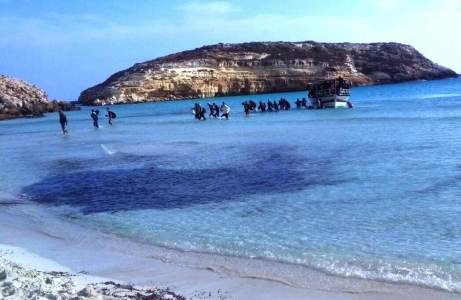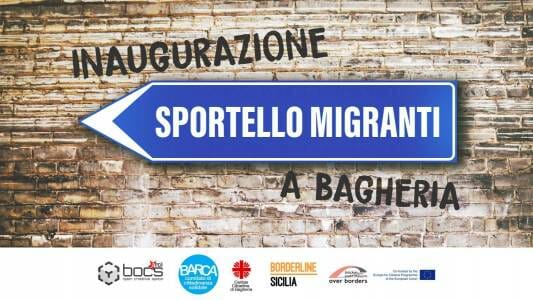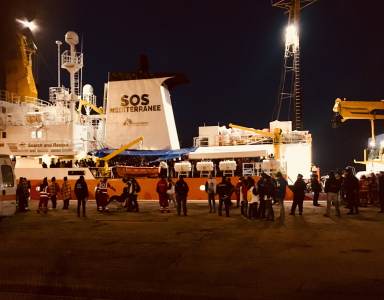Hard to Accommodate: Palermo
In
the past few days we have read about the announcementsby the mayor of Gorino
and the protests held by its citizens, and many of us have condemned
such acts. Without doubt, racism and ignorance have created some
monsters for the front pages, but in the end it has been too easy to
“pick off the easy targets”, and no one in the media has examined
the errors committed by the Prefecture and other institutional
agents, who were unaware of how to set up a reception project: there
was no plan prepared for any interaction between the new arrivals and
the indigenous community, but instead they were inserted into a
situation of emergency, causing simply the latest social conflict
which has served to demonstrate quite clearly the true face of
migration policies and to
continue to reap its harvest of victims.

In
Palermo too, a city defined by many as welcoming, the difficulties
are numerous, as are the situations of illegality which harm
migrants. During the landing of October 24th,
in which 1,096 migrants landed on board the Siem Pilot, the critical
problems of an emergency system were made all too clear: it took 48
hours to complete the identification procedures for everyone who had
arrived; the minors and women slept on the ship and then on the
quayside. In the end, a good number of the arrivals spent the nights
of the 24th
and 25th
October either in the courtyard of the Questura, on the quayside
under a gazebo, or on board the ship. Beyond the slow pace of the
landing operations, it was also the case that many nuclear families
were broken up (despite the efforts at the quay of workers from the
International
Organization for Migration)
and relatives sent to different Extraordinary Reception Centres
(CAS*), all while passing through the strong emotional state pushed
to the edge by the violence of a life-threatening journey.
It
is unacceptable that people can be treated like this, people who have
travelled next to death for so long and carry the signs of the
journey on their bodies. At this landing, some of the migrants
descended in their underwear. From this detail we can only assume
that they spent their two days on board the Siem
Pilot
nude, sleeping on the ground, only to then receive the same kind of
treatment on arrival in Palermo. They stare into the middle distance,
into a void which is useful for making them more convenient subjects.

We call this convenience “emergency”, and in Palermo it comes to
light above all with regards to minors. Until Wednesday evening, the
destination of the newly arrived minors was still unknown, because no
one had managed to find available centres. At first around fifty of
them were to be taken to the Caritas centre in Monreale, a
centre without any workers present, it having fallen to the Red
Cross in the past to watch over the minors. But this time the
managers had removed themselves from this emergency runaround, and it
was necessary for the institutional agents to find alternative
solutions. A response to the city council and the Prefecture came
from the Caritas of Palermo, which hosted 38 minors in its
structure in the locality of Ciminna, after which the other minors
were placed in the centres of ‘first reception’ in Partinico (managed
by Sol.Co) and Via Monfenera in Palermo (managed by Assante),
and the remained in other structures in the province of Palermo.

Seventeen bodies also arrived at Palermo. The survivors, who
experienced the death of friends and relatives during the journey,
received no special attention or treatment, neither from the rescue
nor first aid teams. Everyone was put on the buses headed to North
Italy. There is so much pain that you loose track of it, as much as
those lost at sea.
According
to the outburst of one of the port workers, the 17 bodies were of a
number too slight to have the correct resonance in the media: “what
does it matter if there’s an 8-year-old child among them, who
probably died from beatings!” “These are small numbers, there
won’t be pictures for the television, we won’t remember October 24th,
only October 3rd,
because there were more people that time. But I’m going to ask myself
how come an 8-year-old child can die? I felt more disgusting than
usual after this landing. When I left there were still loads of
people sleeping on the pier, on the ground. I felt complicit in this
fucked up reception system, and I ask myself, can it be right that I
keep on going? Maybe I’m worse than them because I go, and I’m paid
by a system which I don’t agree with.”

Fortunately there are some people in this system, like this woman,
who still question themselves about the path we are taking, and in
silence continue to give a smile and some support to the numerous
victims of this unjust system.
Alberto Biondo
Borderline Sicilia
Project
“OpenEurope” – Oxfam Italia, Diaconia Valdese, Borderline
Sicilia Onlus
*CAS
= Centro di Accoglienza Straordinario (Extraordinary Reception
Centre)
Translation
by Richard Braude



